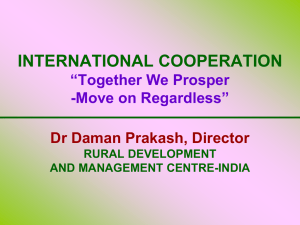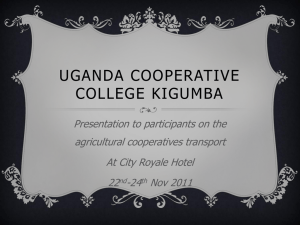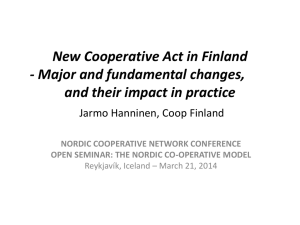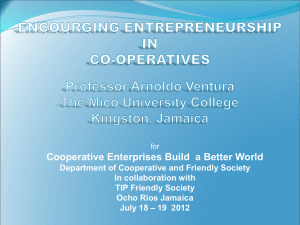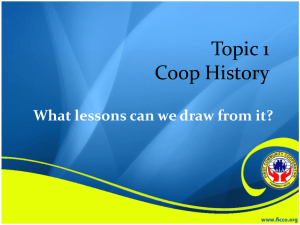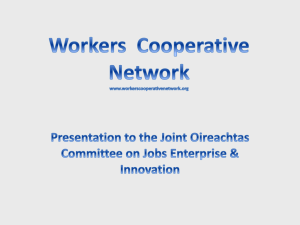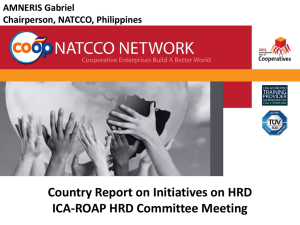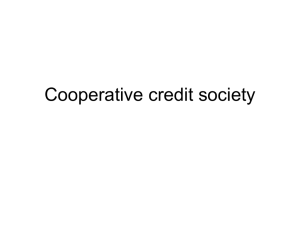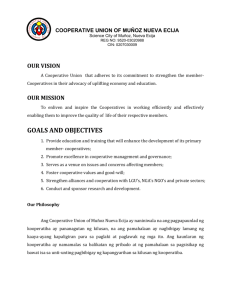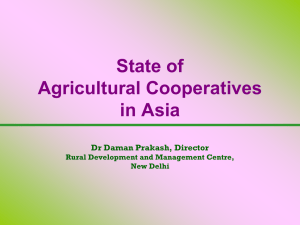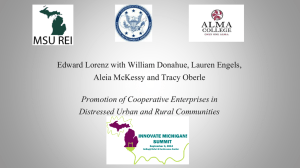Strengthening Primary Agricultural Cooperatives ROLE
advertisement
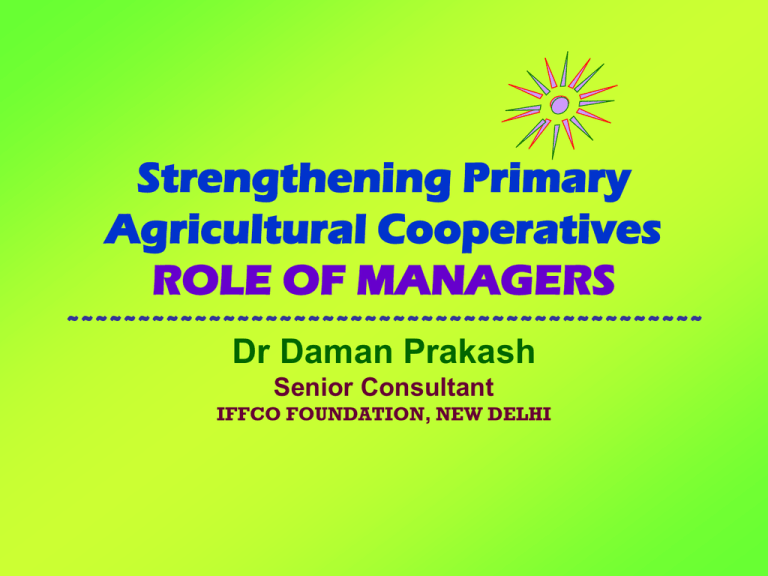
Strengthening Primary Agricultural Cooperatives ROLE OF MANAGERS ~~~~~~~~~~~~~~~~~~~~~~~~~~~~~~~~~~~~~~~~~~~~~ Dr Daman Prakash Senior Consultant IFFCO FOUNDATION, NEW DELHI Primary Agricultural Credit Cooperatives: Are the backbone of agricultural credit system in India; They are an integral part of world’s largest agricultural credit system; Are the strongest chain in the largest Agricultural Cooperative Movement of India; There are over 380,000 agricoops with a membership of nearly 200 million farmers; PACS are the largest contributors to national food stock and Largest distributors of farm inputs; Largest warehousing capacity; Own large industrial and processing units; Have their own federal structure; Hold major shares in cooperative banks; They operate within a legal framework adhering to norms of transparency and fair trade practices; Farmer-Members are the Owners, Managers, Employers, and Estate-owners PACS ARE THE PRIDE OF INDIAN AGRICULTURAL COOPERATIVE MOVEMENT Indian Cooperative Movement 580,000 Coops of all types; 450 million basic members; Already over 100 years old; Cooperation is a State Subject [Multi-State Coops also exist]; Cooperatives observe Principles of Cooperation; General Body is Supreme; Democratic Management [One Member-One Vote Basis]; Generally free from State Controls; Several outstanding achievements: India is world’s largest producer of milk; Holds 45% share in coop ice cream; Highest level of Wheat & Rice Production; World’s No. 2 in Cotton production; Federal structure in all sectors; Largest Coop Education & Training structure; Hassle-free Loaning Procedures; Coop Unions & Banks support all Coops; Loan recovery varies from State to State [Punjab recovery is most outstanding, almost 92%]; Govt provides advisory, guidance and audit services through its field structures. SECRETARIES/MANAGERS ARE THE KEY COMPONENTS OF THIS HUGE AGRICULTURAL CREDIT STRUCTURE IN INDIA MEMBERS GENERAL BODY MEETING ELECTS BOARD OF DIRECTORS AUDITORS BOARD APPOINTS SECRETARY/MANAGER AND OTHER EMPLOYEES COOP BYELAWS HELP GOVERN THE COOPERATIVE BYELAWS ARE ADOPTED BY MEMBERS AND REGISTERED BY THE REGISTRAR ~~~~~~~~~~~~~~~~~~~~~ This document contains information on: Objectives, activities, governance techniques e.g., holding meetings, powers & duties of office-bearers and members, tasks of secretaries/managers, handling of finances, distribution of profits, capital formulation, management of books, audit procedures, legal issues, closure of the cooperative etc. GENERAL BODY FRAMES POLICIES; BOARD FORMULATES ACTION PLANS; SECRETARY/MANAGER IMPLEMENTS. REPORTING IS UPWARD BOARD OF DIRECTORS & AUDIT BOARD ARE ANSWERABLE TO GENERAL BODY; ALL EMPLOYEES REPORT TO BOARD OF DIRECTORS THROUGH THE SECRETARY/MANAGER. ROLE OF THE SECRETARY Manages the Coop in response to the wishes of the General Body, as per directions of the Board and according to the government & bank procedures Ethics, Honesty & Fairness are the foundations to earn goodwill of member-owners TASKS OF SECRETARY ARE LAID DOWN IN THE BYELAWS Some of the important ones are: Holding meetings in time; Fixation of MCL of the Coop and of members; Receive loan applications and get them approved by the Board; Distribute inputs in time and with all fairness; Arrange for disposal of products; Maintaining books of accounts & other books; Follow-up recovery procedures; Laise with Department, Bank & Federation; Keep good rapport with members & office-bearers; Strong inventory & financial controls; Prepare Annual & Audit Reports; Compliances; Reconciliation of accounts; Enhance membership; Expand loaning. SATISFIED MEMBERS ARE A CREDIT TO SECRETARY CAPACITY BUILDING HELPS ALL AND STRENGTHENS THE COOPERATIVE Awareness about Cooperation; Byelaws, Govt Rules & Regulations; Proper paperwork; Business Ethics; Accurate cash/accounts handling; Interaction; Encouraging member participation; Member education & training of office-bearers including Secretary; Involvement of youth and women; interaction with agri extension experts; Frequent visits to members; Proper flow of information. SYNERGY WITH OTHER DEVELOPMENT PROGRAMMES. CAPACITY BUILDING OPPORTUNITIES LEADING TO PROFESSIONALISATION Training programmes offered by NCUI, State Unions/Federations, Management institutes; Conferences, Seminars and Workshops; Field visits. ANY EXPENDITURE ON HUMAN RESOURCE DEVELOPMENT IS AN INVESTMENT. LEARN BUSINESS TECHNIQUES FROM PRIVATE ENTERPRISES. Thank You for your kind attention ~~~~~~~~~~~~~~~~~~~~~~~ Dr Daman Prakash IFFCO FOUNDATION 34 NEHRU PLACE, NEW DELHI 110019 March 03 2009
